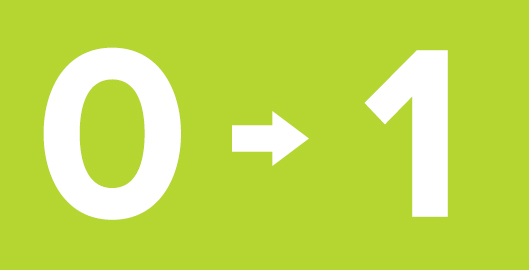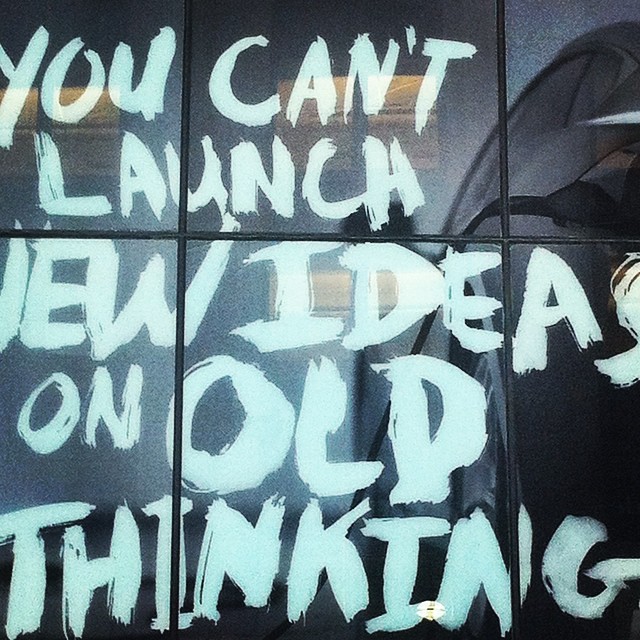
A lot of people ask my when I’m going to create my own product. I haven’t for two reasons.
First, it scares me. In 10 seconds I’ve talked myself out of it by overthinking hiring, insurance, money, etc. But second, and more importantly, I haven’t had an idea that I’m passionate about to go down the path of actually bringing it to life. I wrote more about this in an article over on Medium called The Product Of You.
This week I listened to a great interview on NPR that Peter Theil (@peterthiel) gave. Incase you aren’t familiar with Theil, he was the first outside investor in Facebook, founder of PayPal, and a partner at the investment firm FoundersFund.
In the interview, Theil talks about his new book Zero To One: Notes on Startups, or How to Build the Future. So, what exactly does he mean by “Zero to One”?
Well, business and technology is rampant with people working on ideas that go from 1 to n. Of course, there’s nothing wrong with taking an existing product and making it better. Great innovations can come from trying to improve something. I mean, have you seen the Cooler on Kickstarter that has over 13 MILLION dollars pledged by backers?! And a huge portion of China’s economy is based on intense focus on going from 1 to n. A great example is China’s version of Google Glass which I wrote about last week.
However, Theil says that doing something new, something that will truly be a defining moment in an industry, requires that you focus on going from from Zero to One.
Theil says, “the next Bill Gates won’t be building an operating system” and “the next Mark Zuckerberg won’t be building a social network”.
How do you do that?
To go from Zero to One, you must spot a big business that no one else is building and have the courage to actually do it.
The big problem today is that so many people let other people’s successes to be their roadmaps. As a result of this, they fail to see unchartered waters that may provide an even bigger opportunity (sidenote: a great book on this topic is Blue Ocean Strategy).

One of my pet peeves with the tech industry is that a lot of really smart people (and yes, not everyone) are making a lot of products that frankly aren’t very useful, don’t really do anything positive for the world, and are almost for sport. Recently, an app that let people just send the word “Yo” back and forth raised 1.5 million dollars from 6 various investors. The app has been updated with more functionality over the last few months, so now, it does more than just let people send “Yo” messages back and forth.
I’m sure the people who created it are super smart. They’re ahead of me, they’ve launched their own app and raised $1.5 million dollars. And who knows, maybe Yo will go on to be wildly successful and find some utility or purpose beyond just micro-messaging. Maybe Yo is just a stepping stone. Maybe Yo is the first of many products that the team will build. And for the record, there are many more companies like Yo that some people would classify as “silly” … I just chose Yo as an example because it was the first one I thought of, not trying to single them out (I haven’t even downloaded it yet, only read about it, so who I am to judge?!).
For me though, at the end of the day, I don’t want to do something like that. I want to do something more interesting, more meaningful, more impactful.
Bill Gates recently commented on the state of innovation in Silicon Valley in a TechCrunch interview. Gates said:
“Innovation in California is at its absolute peak right now. Sure, half of the companies are silly, and you know two-thirds of them are going to go bankrupt, but the dozen or so ideas that emerge out of that are going to be really important,”
In the NPR interview with Peter Theil, he talks about how innovation in the 21st century is so hard. He asks “how do we develop the developed world?”
Spotting ideas that opportunities that haven’t been tackled yet is hard, very hard.
If you keep looking, I believe you’ll find it. Maybe not today, maybe not next quarter. But eventually, you’ll stumble across your own roadmap that will take you from Zero to One.
In a recent interview with Forbes, Theil shared this thoughts on what industry would thrive most in the years ahead. Again, he reiterated the importance of being focused on being different, not chasing other people’s roadmaps or past successes:
Don’t worry about being in a hot sector–instead, make sure you’re doing something unique. Unsolved problems are where you’ll find opportunity.
What are your thoughts on innovation today? Are we solving the right problems?
What can we do to encourage more people to think about Zero to One ideas instead of following other people’s roadmaps on the quest to be the next “new and improved” version of something that already exists?